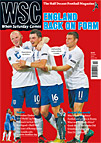 We asked you for your views on a variety of issues in our post-World Cup issue. Roger Titford analyses the responses
We asked you for your views on a variety of issues in our post-World Cup issue. Roger Titford analyses the responses
On Sky TV, Andy Gray has several times passed his firm verdict on the 2010 World Cup – “disappointing”. Well, it wasn’t on Sky, of course. The WSC readership’s view, asked for in three words or fewer in our post-tournament survey, was slightly more nuanced, as you would hope, “strangely unfulfilling”, “dramatic but mediocre”, “curate’s egg – almost”. There was a general feeling of being slightly underwhelmed. “Meh” wrote several but our favourites were “team-work trumps celebrity” and “tippy-tappy tedium”.
Your participation levels in terms of following the tournament were undiminished from the 2006 World Cup, with 34 per cent managing to watch 50-plus matches. Watching games live in the stadium or via giant screen or even round at friend's were all down on 2006. But there was plenty of digital interaction at home and in offices, with 42 per cent watching some games online, 31 per cent accessing the red button and even one per cent voting on ITV’s Man of the Match.
The facility to view online at work severely traduced the category of “lamest excuse/biggest effort made to watch a match” – though we had a few classics: “Leaving grandfather’s memorial service early”; “Left family holiday and travelled 30 miles in France just to watch Ivory Coast v Portugal”; “Arranged foot operation to coincide with World Cup”.
Given the high level of interest (97 per cent watched the Spain v Holland final versus a mere 56 per cent for the Chelsea v Portsmouth FA Cup final), why the disappointment? While 57 per cent took the opportunity to agree with the statement “the worst England performance of all time”, there were frequent grumbles about defensive football and FIFA fat cats and there was the “hyper-hype”. After France 98 we measured 59 per cent claiming “too much hype”, by 2010 the “too much hype” proportion had risen to 74 per cent, an enormous, fabulous, game-changing increase. Over exactly the same period your support for the introduction of video technology has risen from 38 per cent to 52 per cent.
Come the quarter-finals and the readership wanted Germany, Holland, Spain and Ghana in about equal measure to win the tournament. Half the correspondents felt Spain deserved to win the tournament, with Germany a clear second on 36 per cent. Uruguay were voted the favourite underdog, with Ghana and New Zealand tying in second place.
We also asked about the most annoying pundit and the worst football advert/programme intro. Here we really felt your pain and passion (aka swearing) come through the ether. At the top of the table it’s hard to separate Alan Shearer’s lack of incisiveness from Lawro’s corniness, with Andy Townsend in third place. Dishonourable mentions must go to the incomprehensible Emmanuel Adebayor (“Makes Shearer look good”) and Edgar Davids, while John Harkes on US ESPN appeared astonishingly frequently for someone outside our mainstream.
Clive Tydesley, a commentator rather than a pundit, also received many name-checks. By contrast, and to be taken as a compliment, there were very few mentions for Lee Dixon, Clarence Seedorf and Jim Beglin. The most satisfied viewers appear to be those receiving RTE in Ireland. In the bad ads category, Hyundai’s "dancing" cars stood out, though fortunately for them it was often ascribed to their competitors.
The survey also took the opportunity to enquire into two more serious issues. We asked about how the type of stadium now available in the UK affected your match-going experience and enjoyment. There appears to be a clear hierarchy of satisfaction in terms of where a stadium is located, with long-established locations preferred to new venues. Perhaps surprisingly the “unchanged” stadiums are preferred by younger supporters and the new build/new location by older supporters. Less surprisingly, supporters rated their own club’s type of stadium more favourably but the overall results indicate the preferences that neutrals would have. Location is a significant factor, whereas usually the focus is on modernity.
“How often do issues about ownership, financial probity and morality affect who you want to win matches not involving your own club?” Only 12 per cent said they almost always ignored off-the-field matters. Almost half went for the middle option – “it applies to a few clubs only”. The remaining 39 per cent said: “These issues have become a major factor in who I want to see win.” Presumably these issues must change their opinion of and affection for certain clubs and suggests the majority of fans are watching matches through a moral lens.
The small minority of amoralists were more interested than the average in other sports, other football magazines and rated newly built stadiums more highly, and may be indicative of the sought-after leisure audience. Come the 2022 World Cup we’ll doubtless be measuring the size of this supporter-sector again. Many thanks to the 1,300-plus readers who took the trouble to respond to our survey.
From WSC 284 November 2010